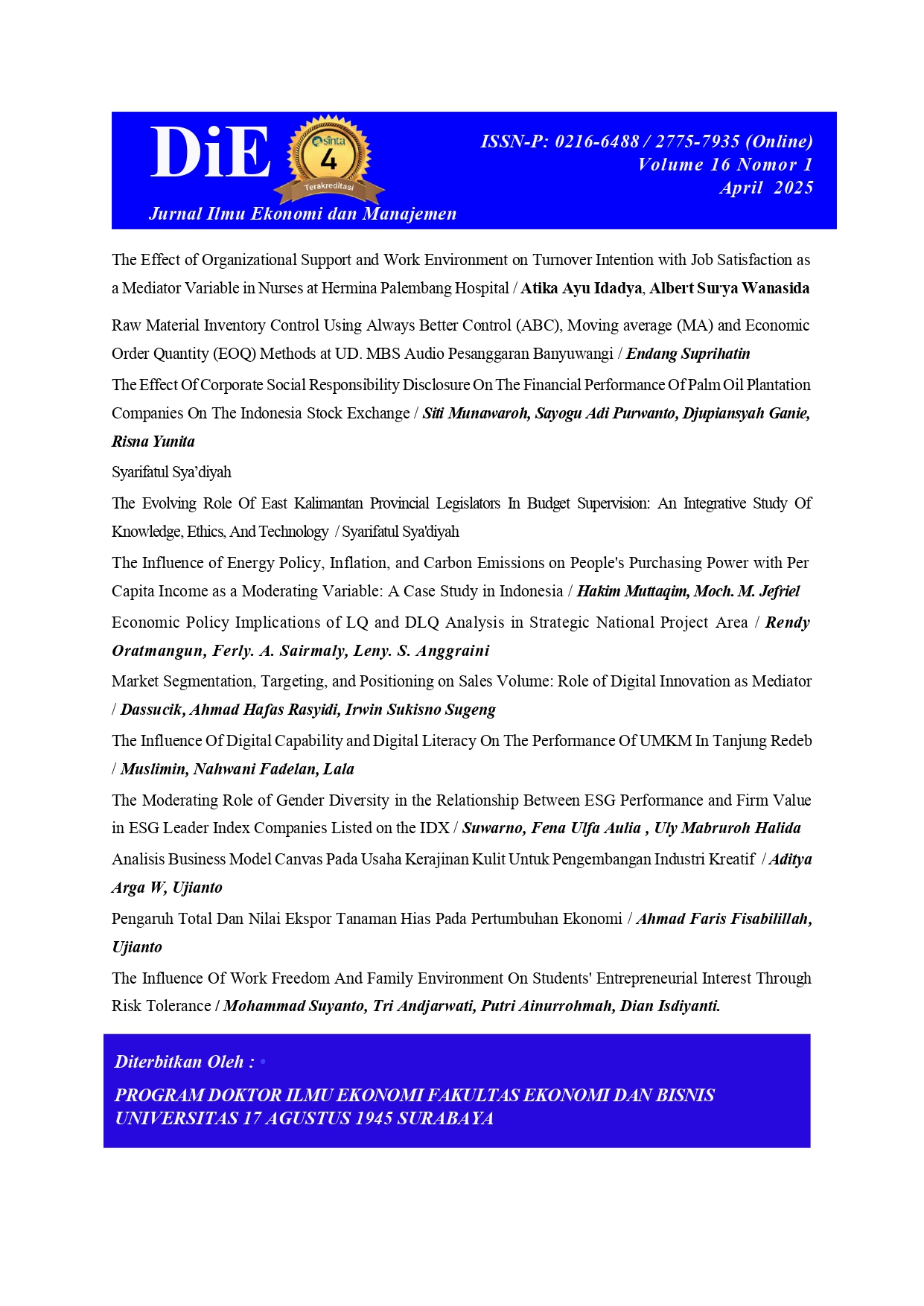THE INFLUENCE OF WORK FREEDOM AND FAMILY ENVIRONMENT ON STUDENTS' ENTREPRENEURIAL INTEREST THROUGH RISK TOLERANCE
DOI:
https://doi.org/10.30996/die.v16i01.132030Keywords:
Freedom to Work, Family Environment, Risk Tolerance, Student Entrepreneurial InterestAbstract
This research aims to determine the influence of Freedom to Work, Family Environment, and Student Entrepreneurial Interest through Risk Tolerance. The sampling technique in this research used purposive random sampling and data collection was carried out using a questionnaire distributed directly to respondents. The population in this study were active students of the Faculty of Economics and Business, University of 17 August 1945 Surabaya who had taken entrepreneurship courses and the sample in this study was 96 respondents. The data analysis technique uses multiple linear regression analysis with the help of the PLS program. The observation results show that the validity test for all variables is said to be valid, this can be seen from the AVE value > 0.05 and the reliability test is said to be reliable, this can be seen from the Cronbach alpha value > 0.7. From the Direct Effect hypothesis test it was found that: 1) The variable Freedom to work has a significant effect on Entrepreneurial Interest, this can be seen from the P Value of 0.025 < 0.050. 2) The Freedom to work variable has a significant effect on the Risk Tolerance Variable, this can be seen from the P Value of 0.016 < 0.050. 3) The Family Environment variable has a significant effect on Entrepreneurial Interest, this can be seen from the P Value of 0.002 < 0.050. 4) Family Environment variables have a significant effect on Risk Tolerance, this can be seen from the P Value of 0.000 < 0.050. 5) The Risk Tolerance variable has a significant effect on Entrepreneurial Interest, this can be seen from the P Value of 0.018 < 0.050. From the Indirect Effect hypothesis test, it was found that 1) Freedom to Work through Risk Tolerance has no significant effect on Entrepreneurial Interest, this can be seen from the P Value of 0.070 > 0.050. 2) The Family Environment variable through Risk Tolerance has a significant effect on Entrepreneurial Interest, this can be seen from the P Value of 0.039 > 0.050.Downloads
References
Adi Susanto. 2000. Kewirausahaan. Jakarta. Ghalia Indonesia
Agusmiati, Dini, Agus Wahyudin. 2018. Pengaruh Lingkungan Keluarga, Pengetahuan Kewirausahaan, Kepribadian, Dan Motifasi, Terhadap Minat. Komunikasi Ilmiah Akuntansi Dan Perpajakan Vol. 12
Akintoye, A. S., & MacLeod, M. J. (1996). Risk analysis and management in construction. International Journal of Project Management, 15(1), 31-38
Alma Buchari. 2016 Manajemen Pemasaran dan Pemasaran Jasa. Bandung. Alfabeta
Alma, B. (2008). Kewirausahaan untuk Mahasiswa dan Umum. Bandung: Alfabeta
Cantillon, Richard. 2011. Essai Sur La Nature Du Commerce En General. Paris: Institut Coppet
Douglas, E., J. and Shepherd, D.,A. (1999). Entrepreneurship as a utility maximizing response. Journal of Business Venturing, Vol. 15 No. 3, pp. 231-51
Drucker, Peter F.1996. Inovasi dan Kewiraswastaan yang diterjemahkan oleh Rusjdi Naib. Jakarta: Erlangga
Hendro. 2005. How to become a smart entrepreneur and to start a new business. Yogyakarta: Adi.
Kao,Raymond Russel M. Knight. 1987. Enterpreneurship And New Venture Management. Prentice-Hall Canada.Scarborough, Ontario
Kao,Raymond Russel M. Knight. 1987. Enterpreneurship And New Venture Management. Prentice-Hall Canada.Scarborough, Ontario.
Loekmono. 1994. Belajar Bagaimana Belajar. Jakarta: BPK Gunung Mulia.
Meredith, G.G. 2000. Kewirausahaan: Teori dan Praktik. Jakarta: Pustaka Binaman Presindo
Muhibbin Syah. 1999. Psikologi Belajar. Jakarta: Logos Wacana Ilmu.
Nida,Hanifah Sausan. Admaja,Hanung Eka. 2021. Analisis Pengaruh Keberhasilan Diri, Toleransi Akan Risiko, dan Kebebasan Dalam Bekerja Terhadap Motivasi Berwirausaha (Studi Kasus Pada Mahasiswa Jurusan Manajemen Universitas Tidar). Business Manajement Analysis Journal. Vol. 4
Praag, C. M. and Cramer, J.S. 2002. The Roots of Entrepreneurship and Labour Demand: Individual Ability and Low Risk. Economica. Vol. 68, No. 259, pp. 45-62.
Rambat, Lupiyoadi. 2004. Manajemen Pemasaran Jasa : Teori dan Praktek. Jakarta: PT Salemba Empat
Rees, Hedley and Anup Shah. 1986. An empirical analysis of self‐employment in the U.K. Econ Papers vol. 1
Slameto. 2003. Belajar dan Faktor-faktor yang mempengaruhinya. Jakarta: Rineka Cipta.
Soekanto, Soerjono. 2004. Sosiologi Keluarga. Jakarta : PT Rineka Cipta.
Soemanto, Wasty. 2008, Pendidikan Wiraswasta. Jakarta : Bumi Aksara.
Sugiyono. (2014). Metode Penelitian Pendidikan Pendekatan Kuantitatif, Kualitatif, dan R&D. Bandung: Alfabeta.
Suhartini, Yati. 2011. Analisis Faktor-Faktor Yang Mempengaruhi Minat Mahasiswa Dalam Berwiraswasta (Studi Pada Mahasiswa Universitas PGRI Yogyakarta). Jurnal Akmenika UPY Vol.7 No.1
Suritno, Arika Winda Cahya. 2022, Pengaruh Kebebasan Dalam Bekerja, Keberhasilan Diri Dan Toleransi Akan Resiko Terhadap Minat Mahasiswa Menjadi Wirausaha Di Surabaya Barat. Pragmatis Jurnal Manajemen dan Bisnis Volume 1, Nomor 2
Suryana. 2006. Kewirausahaan Pedoman Praktis :Kiat dan Proses Menuju Sukses Edisi 3. Jakarta : Salemba Empat.
Susanto, Adi. 2000. Kewirausahaa. Jakarta: Ghalia Indonesia,
Tama, Adi. Angki. 2010. Analisis Faktor – Faktor yang Memotivasi Mahasiswa Berkeinginan Menjadi Entrepreneur. Skripsi Fakultas Ekonomika dan Bisnis UNDIP. Semarang
Yuyun Wirasasmita. 2003. Komunikasi Bisnis. Jakarta : PT Gramedia Pustaka Utama
Downloads
Published
Issue
Section
License
The author who will publish the manuscript at DiE: Jurnal Ilmu Ekonomi dan Manajemen, agree to the following terms:
1. Authors retain copyright and grant the journal right of first publication with the work simultaneously licensed under a Creative Commons Attribution ShareAlike License that allows others to share the work with an acknowledgment of the work's authorship and initial publication in this journal.
2. Authors are able to enter into separate, additional contractual arrangements for the non-exclusive distribution of the journal's published version of the work (e.g., post it to an institutional repository or publish it in a book), with an acknowledgment of its initial publication in this journal.
3. Authors are permitted and encouraged to post their work online (e.g., in institutional repositories, pre-prints sites or on their website) prior to and during the submission process, as it can lead to productive exchanges, as well as earlier and greater dissemination of published work








